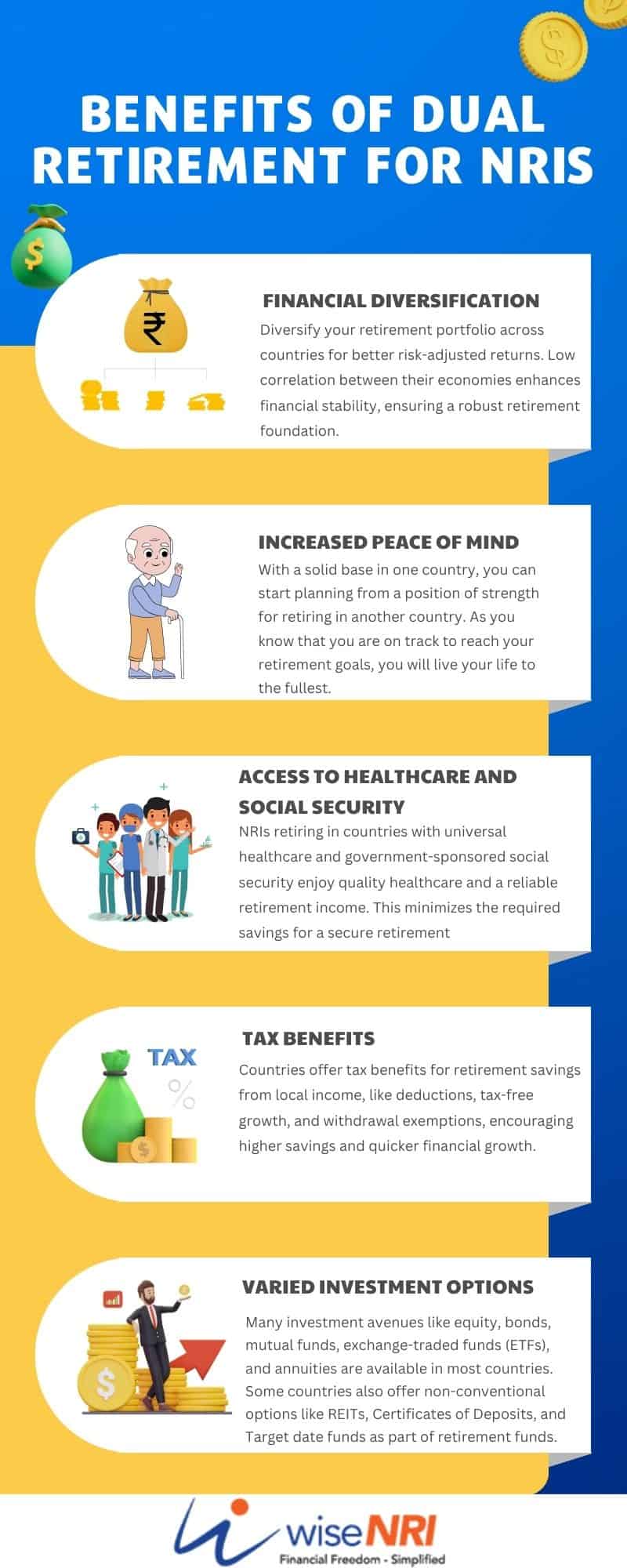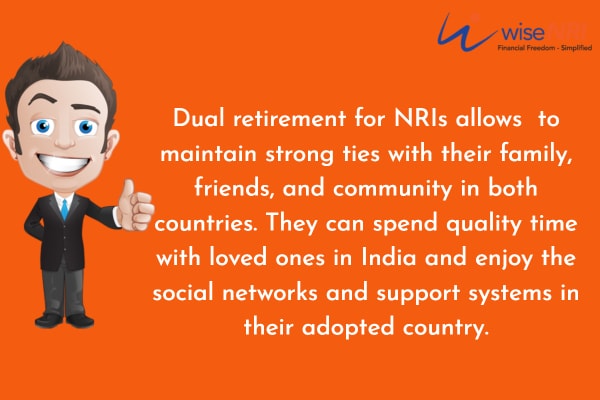Retirement is a significant milestone, representing the culmination of years of hard work and dedication. Retirement planning for Non-Resident Indians (NRIs) often presents unique challenges and opportunities.
As NRIs live and work abroad, they are exposed to different financial systems, tax regulations, and retirement schemes. Many NRIs maintain strong ties to their homeland and envision a retirement encompassing their adopted country and India.

Must Read – How Much Retirement Corpus Is Enough
In many cases, NRIs nearing retirement already own assets in at least two countries – India and their country of residence. If their occupation has taken them places, then they may have investments in more countries.
Understanding Dual Retirement for NRIs
It refers to planning for retirement in two countries for NRIs – the country of residence and India. They want the best of both worlds – financial security and quality of life in their adopted country while also preserving connections with their cultural heritage in India.
It is most suitable for people having sizable assets in both countries – if they are retiring in a few years. In case they have a long runway before retirement, then having a significant base in one country would also be adequate.
Benefits of Dual Retirement For NRIs
In India
Financial Diversification
You can diversify your retirement portfolio by having investments in both countries. With little correlation between the fortunes of both countries, this diversification significantly improves the risk/return ratio, offering a robust financial foundation for retirement.
Increased Peace of Mind
With a solid base in one country, you can start planning from a position of strength for retiring in another country. As you know that you are on track to reach your retirement goals, you will live your life to the fullest.
In the Country of Residence
Access to Healthcare and Social Security
Many countries offer comprehensive contribution-linked and government-sponsored healthcare and social security benefits to all residents. By retiring in their adopted country, NRIs can benefit from these systems. It ensures access to quality healthcare and a reliable income stream during retirement, helping you reduce your overall retirement savings needs.
Tax benefits
Many countries offer tax benefits for retirement savings from the income earned there. These include tax deductions for retirement contributions, tax-free earnings on retirement savings, and tax-free withdrawals after retirement. Such tax benefits help you save more for retirement and grow your savings faster.
Varied investment options
Many investment avenues like equity, bonds, mutual funds, exchange-traded funds (ETFs), and annuities are available in most countries. Some countries also offer non-conventional options like REITs, Certificates of Deposits, and Target date funds as part of retirement funds. It can help you customize your retirement plan to suit your unique needs, risk tolerance, and aspirations.

Must Check – NRIs Boost Their Retirement Savings
Top 11 Considerations for Dual Retirement for NRIs
Despite all the benefits listed above, and the benefits of retirement planning in general, there are some considerations while NRIs plan for retirement in two or more countries. Let us focus on the top 11 Considerations for Dual Retirement for NRIs.
Family and Community Connections
Dual retirement for NRIs allows to maintain strong ties with their family, friends, and community in both countries. They can spend quality time with loved ones in India and enjoy the social networks and support systems in their adopted country.
Support network
Nurturing a support network is crucial for a fulfilling retirement experience. You must consider proximity to family and friends, social connections, and community involvement in times of emergency.
Building a network of like-minded individuals, joining local cultural organizations or clubs, and participating in community activities can help foster a sense of belonging.
Availability for specific needs
As age progresses, the availability of specialty treatment according to illness or infirmity can be an important deciding factor. Some countries have great medical facilities for seniors and people with specific needs such as those having disabilities.
Healthcare and Insurance
NRIs need to assess healthcare options in both countries to ensure they have access to the best medical facilities and adequate coverage. You must evaluate the general healthcare systems and insurance regulations while planning.
Obtaining and keeping health insurance active in both countries even while you are traveling is paramount. If you can get an insurance cover offering comprehensive coverage in both countries at a reasonable rate, then go for it.
Must Check- Planning for Retirement India
Retirement Communities
The availability of a retirement community or an assisted living facility is also a factor. Although some decent projects are coming up in India, a general lack of such facilities here cannot be overlooked.
Inflation
Differences in the cost of living and purchasing power parity between the countries we wish to retire to are also important. You must understand that inflation affects you differently in each country.
For example, fuel costs are higher in India but not in the UAE. Education and medical services are far more expensive in the USA compared to India. Similarly, in most OECD countries the cost of maintenance and hired help is very expensive compared to India.
Therefore, make more realistic – and more conservative, to be safe – assumptions while planning your retirement corpus.
NRIs can also leverage the differences in the cost of living to their advantage by retiring in a country with a lower cost of living. It can effectively stretch your retirement corpus and help you enjoy a higher standard of living.

Must Check – Mr. NRI – Time Is Money When it Comes to Retirement Planning!
Cost of Maintenance
Every asset – financial or physical – incurs a cost of maintenance. When you manage a large corpus and multiple assets spread across two countries, these costs can spiral out of hand.
The ground support and costs required to manage and maintain assets in running condition are significant. Therefore, having a reliable local support system becomes imperative.
Currency Fluctuations
Maintaining a dual retirement corpus exposes NRIs to currency exchange rate risks. Volatility in exchange rates can impact the value of savings, investments, and pensions, affecting your purchasing power in both countries. Therefore, ask your financial advisor to help incorporate hedging strategies in your financial plans.
Tax Implications
Dual retirement involves navigating complex tax regulations in both countries. NRIs must understand tax treaties, double taxation avoidance agreements (DTAAs), and exemptions or benefits available to them.
Seeking advice from financial advisors and tax professionals with expertise in cross-border taxation is crucial to ensure compliance and reduce taxes.
Repatriation of Capital and Income
All countries have different rules for the transfer of capital and income out of their jurisdiction. This makes it necessary to consult financial advisers to remain on the right side of the law.
In India, the Foreign Exchange Management Act (FEMA) and RBI’s Liberalised Remittance Scheme (LRS ) dictate the purpose, amount, and direction of transfers. For example, recently the finance ministry increased TCS to 20% from 5% on sums invested under LRS.
Legal and Regulatory Compliance
In addition to tax and capital regulations, there are other legal and regulatory requirements related to land & property, inheritance & succession, residency requirements, and estate planning. Sometimes there is also a limit on jurisdiction.
For example, in some countries, per applicable laws, you might need probate even after writing a will. While in others, NRIs cannot participate in government saving schemes, investment options, or buy properties. So, always double-check before investing.
Therefore, NRIs must take help from experts to untangle the legal and regulatory maze to ensure a smooth transition into retirement.
Conclusion
Dual retirement provides a unique opportunity for NRIs to create a fulfilling retirement lifestyle encompassing the best of both worlds. By carefully considering the benefits, challenges, and key considerations listed, NRIs can strategically plan their finances, navigate tax complexities, and maintain strong connections with their Indian heritage.
Creating and managing such a vast corpus and deciding how to divide it between two countries certainly requires expertise and professional help. Consulting with financial advisors specializing in cross-border matters will help you make informed decisions to achieve a comfortable and enjoyable retirement experience.
If you are retired or close to your retirement – please share your views in the comment section.

This is a very interesting topic and on the mind many NRIs. I have thought as well about living 6 months in India and 6 months overseas, thereby maintaining NRI status ( not sure if this correct) and at the same time spending good amount of time in India.
It would be good to explain how some dual country retirement can actually work, especially from India tax perspective